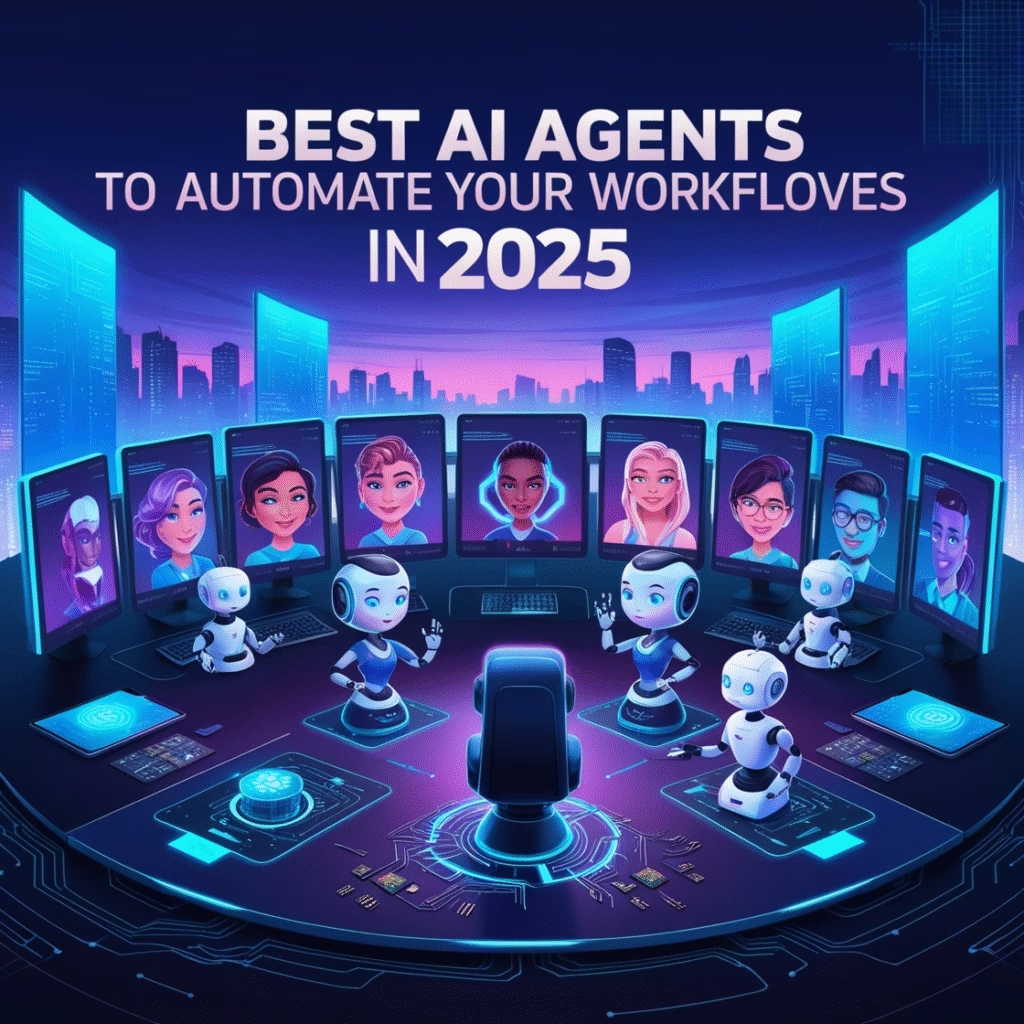Introduction
Imagine this—you wake up, and while you’re sipping your morning coffee, your AI agent has already sorted your inbox, scheduled your day, posted to your business social media accounts, and followed up with leads. Sounds futuristic? Not anymore. This is the power of AI agents at work—today.

With AI becoming more accessible and powerful, automation isn’t just for big corporations anymore. It’s a game-changer for freelancers, entrepreneurs, and companies of all sizes. This article will break down the best AI agents that can take over repetitive tasks, streamline operations, and help you reclaim your time for more strategic, creative work. Whether you’re a marketer, a developer, or a small business owner, you’ll find actionable insights and tools here to level up your workflow with AI.
What Are AI Agents?
Before diving into the best tools, let’s get one thing clear—what exactly is an AI agent? Think of an AI agent as your digital assistant on steroids. It doesn’t just follow commands—it understands context, learns from interaction, and adapts to your preferences.
AI agents differ from traditional tools. A basic tool might send an email when you press a button. An AI agent can write the email, determine the best time to send it, and even follow up if there’s no reply. That’s autonomy, and that’s the future.
Some agents operate via chat interfaces (like ChatGPT), others work in the background (like Reclaim.ai), and some integrate with dozens of apps to connect everything you use. They’re not just smart—they’re proactive.
Benefits of Using AI Agents in Your Workflow
Let’s talk value. Why should you even care about AI agents?
- Time Efficiency: Tasks that used to take hours now take minutes—or seconds.
- Cost Savings: Replace multiple tools or roles with a single, intelligent system.
- Increased Accuracy: Minimize human errors, especially in data entry or scheduling.
- Flexibility: AI agents can adapt to new workflows and scale with your business.
- Availability: These tools work 24/7. No vacations, no sick days.
Think of AI agents like adding a team of tireless workers to your business—without the overhead. They free you up to focus on what you do best.
Key Features to Look for in an AI Agent
Not all AI agents are created equal. Here’s what separates the powerful from the mediocre:
- Natural Language Processing (NLP): Can the tool understand and generate human-like language?
- Integration Capability: Does it play well with tools like Slack, Google Calendar, or CRMs?
- Learning and Adaptability: The best agents improve the more you use them.
- User Interface: Is it intuitive or clunky? A good UI saves time.
- Security and Compliance: Especially important in industries like finance or healthcare.
These are the features that transform a simple bot into a workflow superhero.
Top AI Agents to Automate Your Workflows in 2025
Let’s get to the exciting part—tools you can start using today to make your life easier.
1. ChatGPT by OpenAI
Yes, you’re reading this via a version of ChatGPT, so naturally, it’s at the top of the list. This conversational agent goes beyond simple Q&A—it drafts emails, generates code, creates blog posts, summarizes documents, and so much more.
- Best for: Writers, marketers, educators, researchers
- Standout Features:
- Contextual understanding
- Multilingual capabilities
- Plugin and API support
- Limitations:
- Not always perfect with up-to-date data unless connected to plugins
ChatGPT is like having a multi-talented team member who never sleeps and learns on the go.
2. Zapier AI
Zapier is already a beloved automation tool, but its new AI functionalities make it even more impressive. Now, instead of creating complex zaps (task chains) manually, you can simply describe your desired outcome, and Zapier AI builds the automation.
- Best for: Anyone using multiple SaaS apps
- Integrations: Gmail, Slack, Trello, Salesforce, HubSpot, etc.
- Cool Feature: Multi-step logic flows that trigger based on conditional logic
With Zapier AI, you don’t just automate—you delegate.
3. Clara Labs
Clara is like having a super-efficient executive assistant. It handles scheduling, meeting coordination, and email follow-ups. It reads context and communicates just like a human assistant.
- Best for: Executives, busy professionals
- Strengths:
- Human-like interaction
- Minimal input needed
- Drawback: Limited to scheduling and communication
Clara’s niche focus makes it incredibly effective at what it does.
4. Reclaim.ai
Ever wish your calendar could defend your focus time? Reclaim.ai does that. It automatically blocks off time for deep work, manages your to-dos, and even helps you make room for personal goals.
- Best for: Remote workers, productivity nerds
- Notable Tools:
- Smart meeting scheduling
- Sync across multiple calendars
- Limitation: Best paired with Google Calendar
This agent literally gives you your time back—day after day.
5. Copy.ai
Content marketers, rejoice. Copy.ai uses AI to generate blog content, product descriptions, social media posts, and more. It even offers branding frameworks and campaign ideas.
- Best for: Marketing teams, solo entrepreneurs
- Great At:
- Generating multiple copy variations
- Supporting creative campaigns
- Con: Content may need light editing for tone
With Copy.ai, you don’t have to stare at a blank page ever again.
Industry-Specific Use Cases of AI Agents
In Marketing
Marketing teams are under constant pressure to produce more content, track more metrics, and engage more audiences—all with limited time. This is where AI agents come in like a secret weapon.
AI tools like Copy.ai, ChatGPT, and Jasper are already transforming how marketers operate. They can whip up blog posts, ad copy, product descriptions, and even social media calendars in a fraction of the time it would take a human.
Here’s what they’re doing in marketing:
- Email Campaign Automation: From drafting subject lines to sending personalized emails based on user behavior.
- Ad Optimization: A/B testing creatives and adjusting ad spend automatically based on performance.
- SEO Support: AI can now suggest keywords, audit pages, and even write optimized meta descriptions.
- Analytics Reporting: AI can pull insights from tools like Google Analytics and turn them into easy-to-understand summaries.
Imagine having a 24/7 assistant who not only writes your marketing content but also tracks its success and offers suggestions to improve. That’s AI in marketing.
In Customer Service
You’ve probably already chatted with an AI agent and didn’t even know it. That’s how seamless today’s customer support bots have become. Tools like Intercom, Zendesk AI, and Ada are leading the charge.
Here’s how they’re enhancing support:
- Instant Responses: Handle FAQs without involving a human agent.
- Sentiment Analysis: Understand customer emotions and escalate issues when needed.
- Multilingual Support: Talk to customers in their native language instantly.
- 24/7 Availability: Never miss a customer query again.
For businesses dealing with high volumes of support requests, AI agents offer a scalable way to improve service and cut costs.
In HR and Recruitment
Recruiting is time-consuming. Sorting through resumes, scheduling interviews, and sending updates can take up a chunk of your day. AI agents like Paradox, HireVue, and XOR are turning hiring into a breeze.
- Resume Screening: AI tools can screen thousands of resumes and rank candidates.
- Interview Scheduling: Coordinate interviews automatically across time zones.
- Chatbots for Candidate Interaction: Answer common queries, guide applicants through the hiring process.
- Bias Reduction: By analyzing purely on skills and qualifications, AI can reduce unconscious bias in the hiring process.
Whether you’re hiring for a startup or a multinational, AI makes the hiring process faster and smarter.
In Software Development
Yes, developers are now automating parts of development with AI agents. GitHub’s Copilot, for example, is like a coding buddy that suggests code snippets, fixes bugs, and even explains complex functions.
Key benefits:
- Code Generation: Write boilerplate code in seconds.
- Error Detection: AI can point out logic issues or suggest fixes in real time.
- Documentation: Generate comments and documentation for your code automatically.
- Workflow Automation: Tools like Zapier and n8n can automate deployment pipelines and ticket updates.
Developers are using these tools to work smarter—not harder.
How to Choose the Right AI Agent for Your Needs
Not all AI tools are the right fit for everyone. Picking the right one is like choosing the right teammate. Here’s how to get it right.
- Identify Your Workflow Pain Points
- Are you spending too much time answering emails?
- Is content creation eating up your hours?
- Do you struggle with staying organized?
Start with what’s slowing you down.
- Set Clear Goals
- Do you want to increase productivity?
- Cut down costs?
- Improve customer response times?
- Evaluate Integration Needs
- Does the tool work with your CRM?
- Can it sync with Slack, Gmail, or your calendar?
- Check for Scalability
- Will the tool still work as your business grows?
- Budget Considerations
- Many tools offer free trials or freemium models—test before investing.
- Support and Community
- Does the company offer solid customer service?
- Is there a user community or documentation?
Choosing the right AI agent is about finding the one that fits seamlessly into how you work and scales with you.
Challenges and Limitations of AI Agents
Sure, AI agents are awesome—but they’re not without their drawbacks. Here’s a reality check:
- Data Privacy Risks: Feeding sensitive data into AI can be risky. Ensure the tool is compliant with GDPR, HIPAA, or other regulations.
- Over-Reliance on Technology: Too much automation can remove the human touch, especially in customer service or creative roles.
- Learning Curve: Some tools require time to set up and train.
- Inaccuracy: Not all outputs are perfect. You still need human oversight.
- Cost Creep: Monthly fees can add up, especially with multiple tools.
AI agents should augment your workflow—not run it entirely. A hybrid approach often works best.
Future Trends in AI Workflow Automation
AI is just getting warmed up. Here’s what’s on the horizon:
- Autonomous Agents: Tools that not only react but plan and act on your behalf. Think AI that can manage an entire marketing campaign or sales funnel autonomously.
- Personalized AI: Agents that learn your tone, preferences, and style over time.
- Voice-Activated Workflow Management: “Hey AI, summarize my inbox” is the new normal.
- Deep Integration Across Stacks: Cross-platform agents that unify data and actions across all business tools.
- Ethical AI and Transparency: As usage grows, expect more focus on ethical use and auditability.
We’re moving toward a world where your AI doesn’t just help—it thinks ahead for you.
Best Practices for Implementing AI Agents
So you’re ready to adopt AI. Here’s how to make it smooth and successful:
- Start Small: Pick one task or department and experiment.
- Train Your Team: Make sure everyone knows how to use the tools.
- Monitor Performance: Track time saved, errors reduced, and ROI.
- Iterate and Improve: AI gets better with feedback—give it!
- Backup Plans: Always have a human override just in case.
With the right strategy, AI adoption can transform your entire business.
Conclusion
AI agents aren’t just a cool trend—they’re the new backbone of modern workflows. From automating emails to managing schedules and generating content, these digital sidekicks are helping teams do more with less. The key is to choose the right tools, integrate them wisely, and keep the human element in check.
Whether you’re a solo entrepreneur or leading a growing team, there’s never been a better time to embrace AI. Start with one agent, one workflow. Then scale. The future of work is here—and it’s automated.
FAQs
- What industries benefit the most from AI agents?
Almost every industry, but especially marketing, customer service, HR, and software development. - Can small businesses afford to use AI agents?
Absolutely! Many tools offer free versions or affordable monthly plans. - Are AI agents difficult to integrate into existing systems?
Most modern AI tools come with plug-and-play integrations for popular platforms. - Do AI agents require coding skills to use?
Not at all. Most tools are user-friendly and require no technical knowledge. - How secure are AI agents?
Leading AI platforms follow strict security protocols, but always vet tools for compliance with your data privacy needs.




